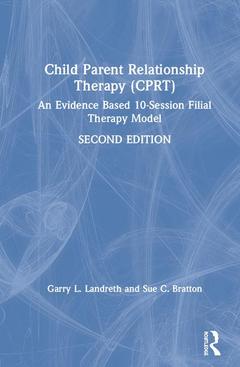Child-Parent Relationship Therapy (CPRT) (2nd Ed.) An Evidence-Based 10-Session Filial Therapy Model
Auteurs : Landreth Garry L., Bratton Sue C.

Child-Parent Relationship Therapy (CPRT), grounded in the attitudes and principles of Child-Centered Play Therapy (CCPT), is based on the belief that a parent acting as an agent for change in place of a play therapist has potential for significant and lasting therapeutic gains. This newly expanded and revised edition of Child-Parent Relationship Therapy (CPRT) describes training objectives, essential skills and concepts taught in each session, as well as the format for supervising parents? play sessions. Transcripts of actual sessions demonstrate process and content in the 10 CPRT training sessions. Research demonstrating the effectiveness of CPRT on child and parent outcomes is presented in support of CPRT?s designation as an evidence-based treatment model.
This second edition is updated to include six new chapters exploring the topics of cultural considerations for working with ethnically and racially diverse families, neuroscience support for CPRT, and adaptions for specific populations including parents of toddlers, parents of preadolescents, adoptive families, and the teacher/student relationship. The authors? expertise and experience results in a book that is essential reading for both students and professionals. By using this text and the accompanying treatment manual, filial therapists will have a complete package for training parents in the CPRT model.
Preface
Acknowledgments
Contributing Authors
1 History, Development, and Objectives of Child-Parent Relationship Therapy (CPRT): A 10-Session
Filial Therapy Model
2 Neuroscience and CPRT
Raissa M. Miller
3 Unique Features of CPRT
4 Training and Supervision of CPRT Filial Therapists
5 Critical Components in Facilitating the Process of CPRT
6 CPRT Skills, Concepts, and Attitudes to Be Taught
7 The 10-Session CPRT Training Process
8 CPRT Training Session 1: Training Objectives and Reflective Responding
9 CPRT Training Session 2: Basic Principles for Play Sessions
10 CPRT Training Session 3: Parent-Child Play Session Skills and Procedures
11 CPRT Training Session 4: Supervision Format and Limit Setting
12 CPRT Training Session 5: Play Session Skills Review
13 CPRT Training Session 6: Supervision and Choice Giving
14 CPRT Training Session 7: Supervision and Self-Esteem-Building Responses
15 CPRT Training Session 8: Supervision and Encouragement vs. Praise
16 CPRT Training Session 9:
Supervision and Generalizing Skills 17 CPRT Training Session 10: Evaluation and Summing Up
18 Adapting CPRT for Parents of Toddlers
Mary Morrison Bennett and Kara Carnes-Holt
19 Adapting CPRT for Parents of Preadolescents
Peggy L. Ceballos, Kristin Meany-Walen, and Kara Carnes-Holt
20 Adapting CPRT for Adoptive Families
Kara Carnes-Holt and Kristie Opiola
21 Adapting CPRT for Teachers
Mary Morrison Bennett and Wendy Pretz Helker
22 Culturally Responsive CPRT
Angela I. Sheely-Moore, Peggy L. Ceballos, Yung-Wei Lin, and Yumiko Ogawa
Garry L. Landreth, EdD, LPC, RPT-S, is regents professor emeritus, department of counseling and higher education, and founder and director emeritus, Center for Play Therapy at the University of North Texas.
Sue C. Bratton, PhD, LPC-S, RPT-S,is professor emerita, department of counseling and higher education, and director emerita, Center for Play Therapy at the University of North Texas.
Date de parution : 08-2019
15.2x22.9 cm
Disponible chez l'éditeur (délai d'approvisionnement : 14 jours).
Prix indicatif 166,93 €
Ajouter au panierDate de parution : 09-2019
15.2x22.9 cm
Thème de Child-Parent Relationship Therapy (CPRT) :
Mots-clés :
Child Centered Play Therapy; CPRT Training; CPRT; Landreth; Bratton; filial; filial therapy; play therapy; family therapy; parent child therapy; child parent relationship therapy; Special Playtime; CPRT Training Session; therapy model; Filial Therapy Training; Basic Child Centered Play Therapy; Play Sessions; CPRT Session; Play Session Skills; CPRT Skill; Choice Giving; CPRT training sessions; Child Centered Play Therapy Skills; neuroscience research; Home Play Sessions; cultural considerations; Filial Play Session; evidence-based treatment model; Child Centered Play Therapy Principles; Therapeutic Limit Setting; Parent Child Play Session; CPRT Group; Filial Therapist; Special Play Sessions; Filial Therapy Groups; Demonstration Play Sessions



